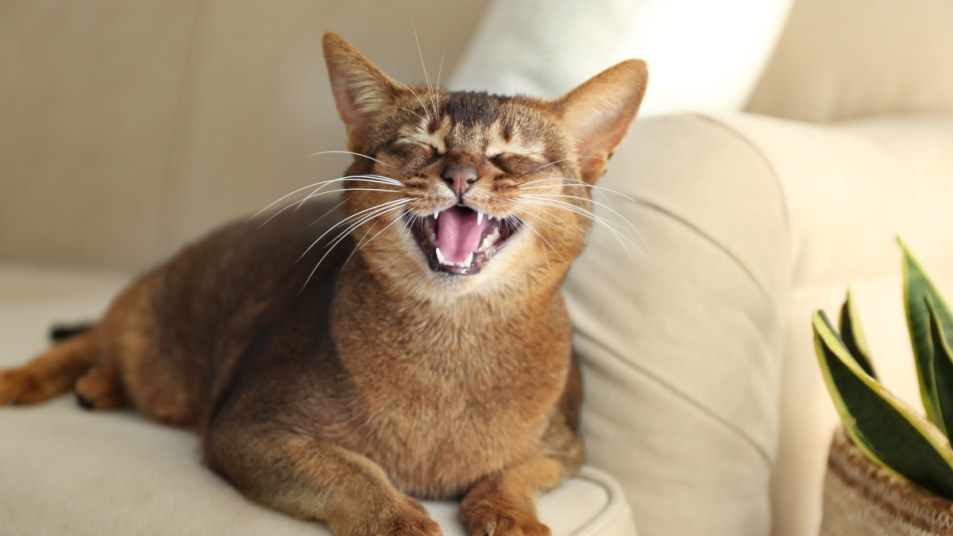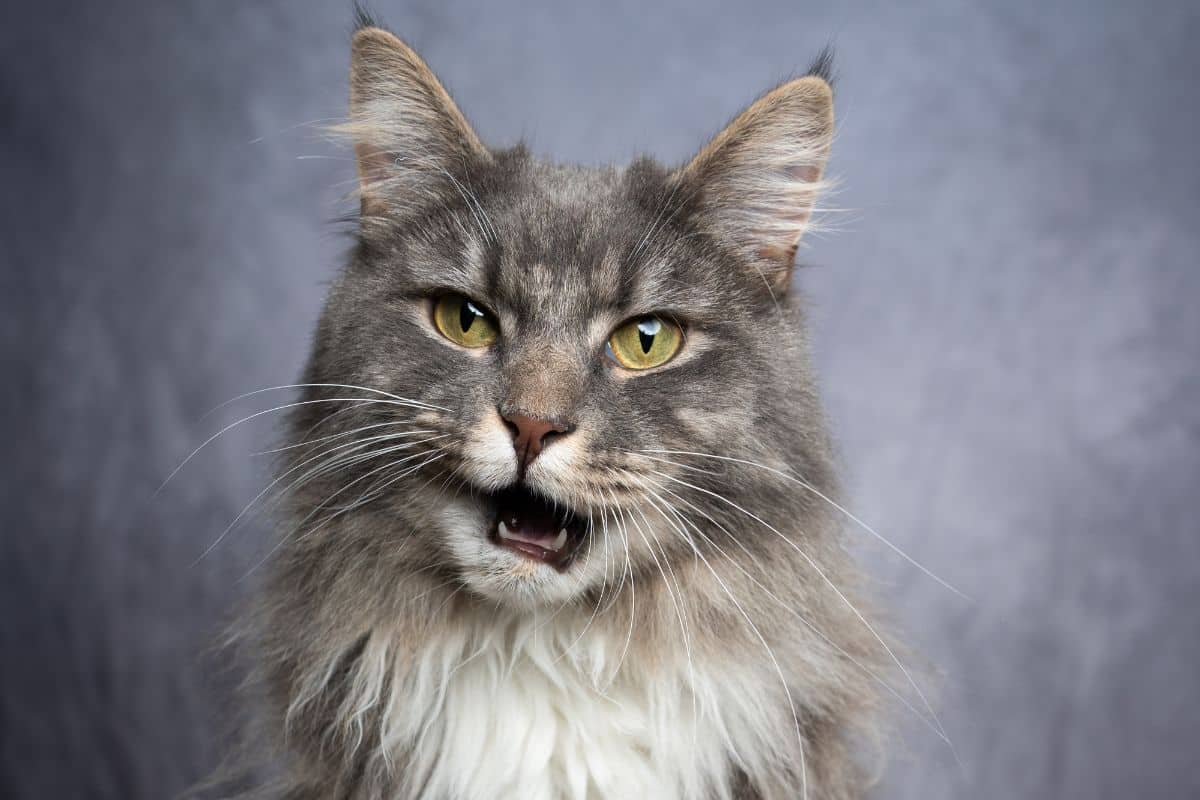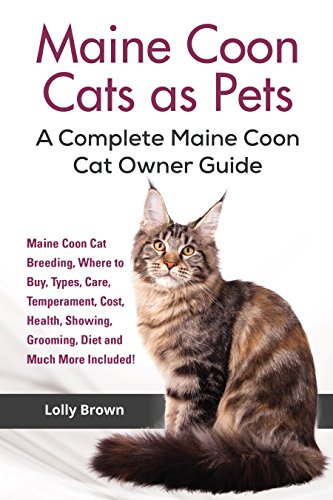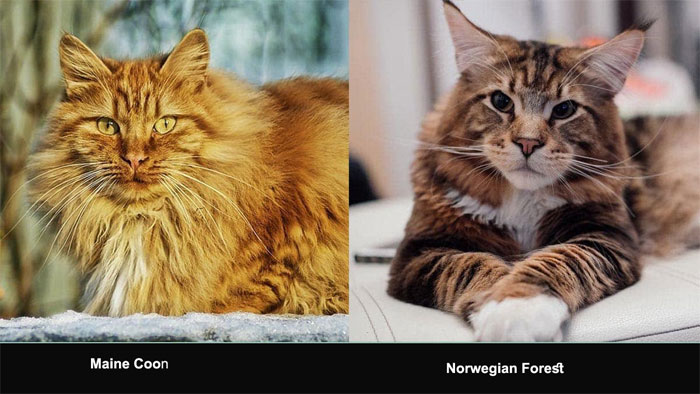Maine Coon cats are vocal due to their sociable nature and desire for interaction. They communicate through varied vocalizations to express their needs and emotions.
Maine Coon cats have a reputation for being the “gentle giants” of the feline world, with their large size and friendly disposition. Not only are they known for their distinctive physical characteristics, but they also captivate their owners with frequent and engaging vocalizations.
These fascinating felines use an array of chirps, trills, and meows to communicate with their human families, reinforcing their bonds and expressing their desires. Their talkative behavior is often reflective of their outgoing personalities, making them one of the most communicative cat breeds. Understanding why Maine Coon cats are so chatty can provide insights into their unique behaviors and help enhance the human-animal bond for cat enthusiasts and owners alike.

Credit: www.womansworld.com
Maine Coon Vocalizations: More Than Just Meows
The Maine Coon, a giant among domestic cats, is not just renowned for its impressive mane and bushy tail. This breed is also famous for ‘talking’ to their human companions. Unlike most felines, Maine Coons use a complex range of vocalizations to communicate.
The Wide Range Of Sounds Maine Coons Make
Maine Coon cats are truly orchestras of the cat world. Their repertoire goes far beyond the simple meow. Owners report a fascinating array of sounds that include:
- Chirps that seem like a mix of a meow and a trill,
- Trills, a soft rolling R sound usually made in greeting,
- Murmurs and mumbles during casual lounging,
- Howls that express displeasure or demand attention.
These vocalizations are part of their charm, with each sound serving a specific purpose in their daily lives.
Comparing Maine Coon Chirps, Trills, And Howls With Other Breeds
When compared to other cat breeds, Maine Coons’ sounds are distinctly different. For example, the Siamese is known for its loud and persistent meows, while the Persian is much more soft-spoken.
| Breed | Sound Type | Characteristics |
|---|---|---|
| Maine Coon | Chirps and Trills | Conversational and musical |
| Siamese | Meows | Loud and high-pitched |
| Persian | Purrs and Hushed Tones | Quiet and understated |
In stark contrast, Maine Coon chirps and trills are more melodic and varied. These cats may even use their distinct howls to communicate specific needs. Their vocalizations make them stand out as the most verbose and expressive among the feline family.

Credit: www.amazon.com
Decoding The Chatter: What Does All This Talking Mean?
Maine Coon cats, known for their impressive size, also stand out for their vocalizations. Unlike the more reserved feline breeds, Maine Coons seem to enjoy a hearty chat with their humans. This often-leaves owners wondering: Why do these gentle giants talk so much? To uncover the truth, delve into the articulate world of Maine Coons. Their vocal repertoire is not just noise; it represents complex communication.
From Hunger To Affection: Interpreting Maine Coon Communication
Maine Coons express themselves for varied reasons. Their “talking” can indicate hunger, happiness, or the need for cuddles. Understanding these vocal cues strengthens the bond between cats and their humans. Let’s break down what a Maine Coon might be saying:
- “Meow” on repeat: Possibly hungry or wants treats.
- Soft chirps: May express contentment or a greeting.
- Purr combined with a nudge: Often a sign of affection.
- An elongated “meow”: Could signal loneliness or desire for attention.
- High-pitched trills: Could be an invitation to play or explore.
These distinctive sounds show emotions and requests. Watch for body language to interpret what a Maine Coon might be saying. A raised tail or a nuzzle accompanies their chatting when conveying love.
How Environment And Attention Influence Their Vocal Behavior
Maine Coons thrive when engaged with their environment and humans. A stimulative setting keeps them chatty and cheerful. Consider the factors influencing their vocal behavior:
- Variety of toys: Keeps them entertained and less vocal from boredom.
- Interactive play: They “talk” more during activities, showing enthusiasm.
- Quiet time: Too much solitude can lead to increased meows for attention.
- Routine changes: These sensitive cats might voice their unease with change.
Your Maine Coon’s talkativeness can be a response to their environment and how much interaction they receive. They thrive on attention and tend to be more vocal when their humans are around. Their communication is also a barometer of their wellbeing, signaling if they’re happy, stressed, or in need of something.
Recognizing and responding to your Maine Coon’s chatter deepens your connection. Tune into their vocalizations and body language. They have much to say, and understanding them can bring joy and harmony into your shared home.
The Science Of Speech: Genetics And Physiology
Maine Coon cats are renowned for their charming personalities and vocal nature. Unlike other feline friends, these cats possess a penchant for ‘talking’ to their humans. But what lies beneath this talkative trait? Is it their genetics, their physical traits, or a combination of both? Let’s explore the fascinating scientific reasons behind the Maine Coons’ expressive vocalizations.
The Hereditary Basis For Maine Coons’ Chattiness
- Maine Coon cats inherit their sociable nature. Studies suggest chattiness passes down through genes.
- Research identifies specific genetic markers linked to vocal behaviors.
- Voice is as unique as a fingerprint, partly due to genetic makeup.
- Experts believe Maine Coons’ ancestors might have been selected for their sociability, including vocal communication.
- This continuous breeding led to the nurturing of the Maine Coons’ vocal expression.
Anatomical Traits That Contribute To Their Unique Sounds
- Maine Coons have a distinct vocal anatomy. It includes longer vocal cords and a wider larynx.
- The shape of their vocal tract enables a range of sounds, from chirps to trills.
- These physical traits permit them to produce melodic and resonant tones.
- A robust chest cavity enhances their vocal power.
- Their expressions often match their emotions, thanks to facial muscle configuration.
Observing a Maine Coon’s body language alongside their vocal cues offers insights into their feelings and desires. When Maine Coons ‘talk,’ they don’t just make noise—they communicate.
Nurturing The Conversation: Human-cat Interaction
Maine Coons are known for their “conversations.” Cat lovers find their vocalizations endearing. Let’s explore why Maine Coons are such chatty companions and how to nurture their vocal habits.
The Role Of Social Bonding In Vocal Behavior
Maine Coon cats thrive on companionship. These fluffy giants bond deeply with their human families. Through a mix of mews, chirps, and trills, they aim to communicate. This vocal behavior strengthens their bonds with us. The more we respond, the more they talk.
- Positive reinforcement cements this bond.
- Consistent engagement leads to increased vocalization.
- Paying attention to their cues suggests contentment and trust.
Training And Encouraging Vocal Responses
A Maine Coon’s chattiness can be nurtured. Interactive play sessions and talk-back reinforce this behavior. By training and encouraging these vocal responses, we deepen our mutual understanding.
- Use treats as rewards for vocal interaction.
- Regularly speak to your cat to promote back-and-forth conversation.
- Associate words with actions to build understanding.
Remember, each cat is unique. Patient and attentive interaction will reveal what works best for your Maine Coon’s vocal habits.
When Talking Becomes Excessive: Addressing Over-vocalization
Maine Coon cats are known for their charming chatter, but sometimes their vocal habits can tip over into something a little more insistent. When Talking Becomes Excessive: Addressing Over-Vocalization, we must decipher the reasons behind this behavior. An excessively vocal Maine Coon could mean something’s amiss. It’s important to tune into their needs and address any issues that might be causing their constant chatter.
Identifying Causes Of Non-stop Meowing
Understanding why your Maine Coon won’t stop talking is the first step to finding a solution. Here are some common reasons:
- Hunger or thirst: Your cat might be telling you it’s mealtime.
- Attention seeking: Perhaps your feline friend just wants some love.
- Health issue: Sometimes, it’s a sign they’re not feeling well.
- Anxiety or stress: Changes in their environment can upset them.
Strategies To Calm An Overly Talkative Maine Coon
Here are effective ways to soothe your chatty companion:
- Keep a routine: Regular feeding and playtimes help them feel secure.
- Interactive toys: These can keep them entertained when you’re busy.
- Veterinarian check-up: Rule out any potential medical concerns.
- Quiet time: Dedicate a calm space in your home for them to relax.

Credit: www.amazon.com
Frequently Asked Questions For Why Do Maine Coon Cats Talk So Much
Are Maine Coon Cats Chatty?
Maine Coon cats are known to be quite vocal. They often communicate with distinctive trills, chirps, and meows, engaging with their owners.
Why Do Maine Coon Cats Meow A Lot?
Maine Coon cats often meow a lot to communicate with their owners. They’re known for their vocal nature, expressing needs or seeking attention through their distinctive meows. Keep interactions consistent to understand their unique vocalizations.
What 2 Breeds Make A Maine Coon?
The Maine Coon cat breed is not a crossbreed but rather a natural breed with its origins in the northeastern United States. It has no specific “two breeds” that combine to make it. The breed developed from a mix of long-haired domestic cats and overseas breeds brought to America by seafarers.
Are Maine Coon Cats Needy?
Maine Coon cats are social and enjoy companionship but aren’t excessively needy. They balance affection with independence, often following owners around without demanding constant attention.
Conclusion
Maine Coon cats are indeed chatterboxes of the feline world. Their vocalizations express emotions, needs, and a desire to interact with their humans. Cherishing their company means engaging in constant ‘cat chat. ‘ Encourage their talkative nature and celebrate the quirky charm of your Maine Coon’s many meows.



